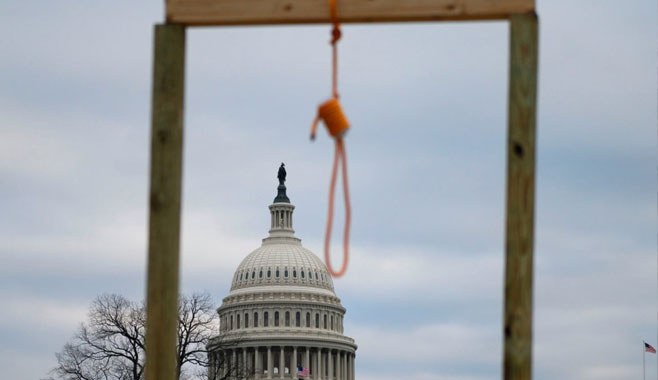Film
Orwell: 2+2=5 (2025)
Raoul Peck
4/5
Yet another warning bell for civil society
This hard-hitting documentary crams the debunking of as many lies and manipulations as possible into its richly textured rhapsodic structure. Using Orwell’s personal history and thinking as a starting point, through the juxtaposition of variety of material including present and past documentary and feature footage, Peck’s film does much more successfully what Kapadia’s 2073 only attempted last year, bringing us to face the totalitarian dysfunction of our times. Peck’s reach is comprehensive and global and his narrative logic mature and urgent.


The narrative voice is enacted by Damian Lewis, who with his best old Etonian voice convincingly reads Orwell’s words. Indeed, most of the film consists of illustrations of Orwell’s prescient pronouncements. ‘War is Peace, Freedom is Slavery, Ignorance is Strength’ sums up what is going on in our present better than anything else.
There is nothing new to totalitarian methods and strategies, they just seem to proliferate particularly nefariously today and to endanger our democracy. Towards the end there are multiple snippets of TV journalists saying the same line, ‘this is dangerous for our democracy’ over and over, and although we know that there are huge differences between those journalists who speak the truth and those who peddle lies and misinformation that their masters instruct them to, this simple sentence equalises the truth-tellers and the liars in an uncomfortable embrace.
The picture of Orwell as a baby with his Indian nanny powerfully brings to mind the disfunction of the British ruling classes who would leave their precious offspring in the care of those who they despise and barely consider human. The sections where Orwell’s voice dissects the identity of the ‘lower-upper class’ that he belongs to are among the most compelling, because they are brutally honest. Isn’t it baffling and ridiculous that a category such as ‘lower-upper class’ actually exists? Emigration to a British colony was for the lower-upper classes a great solution to their feelings of inferiority at home. Once abroad they could proceed to bully the natives which made them feel better about themselves. But all this only serves to remind us how powerful the class structures still are in modern Britain. Orwell’s condemnation of the British ruling classes is still as perspicuous and accurate as ever.

There is no escaping the fact that this film is quite depressing. There are many body bags, disfigured faces as well as a constant barrage of lies, many of them overly familiar from our daily news programmes and social media trash. But we can only consider ourselves lucky that Orwell’s youthful years as a policeman in Burma in the service of the British empire transformed him, made him see the colonialism for what it truly is and turned him into a lifelong resistance fighter, always siding with the oppressed. He understood very early on how far the lies and manipulation of those who have swindled their way into power can take us.
Orwell’s often quoted pronouncement “The opinion that art should have nothing to do with politics is itself a political attitude.” still seems the most elegant statement on the subject. When we shy away from confronting injustice, our attitude can only embolden it, and that can only be considered to be a political act.
Another biographical element that features quite strongly is Orwell’s illness. In many scenes we hear his heavy beathing over the footage, a sign that he is still there with us, witnessing with us. Illness was an important influence in his life, as it has been for many writers and thinkers. Being ill removes any possibility of a rose-tinted perception of the world.

One of the weaknesses of the film is in trying to have a few enacted scenes where an actor plays Orwell, but these clash with Damian Lewis’ strong narrative voice. It would have been better perhaps if the enacted scenes were silent. But the main problem with this excellent film is that it really isn’t thought-provoking enough. And the fault lies with the depressing reminders of what we all already know far too well. The film presents the world as it is, but that doesn’t help us do something about it.